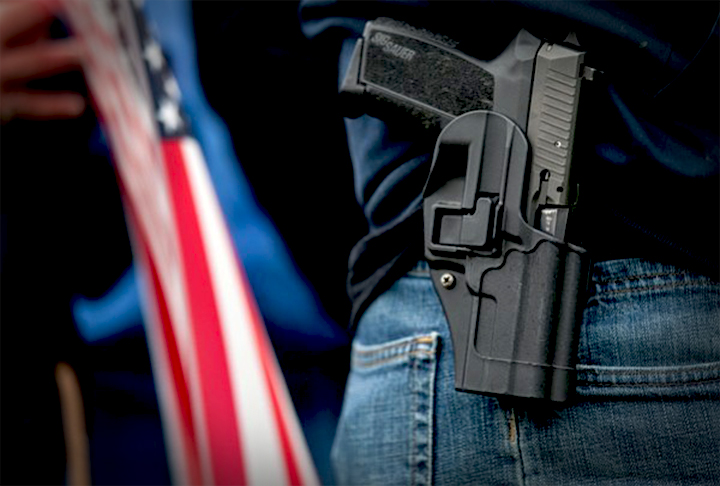Last week, Cortney wrote about Justice Clarence Thomas becoming irritated that the Supreme Court passed on yet another gun rights case that dealt with one of the last fronts in the Second Amendment fight: “shall issue” vs. “may issue” and the question of whether it is a constitutional right to carry handguns in public. We haven’t answered that question yet. When the Obergefell decision on gay marriage was handed down in 2015, some gun rights activists felt it applied to carry permits. The National Rifle Association said that wasn’t the case.
“We strongly advise concealed carry license holders not to assume Obergefell provides them with the legal basis they need to carry without an in-state license in strongly anti-gun states such as Maryland, New Jersey, or New York,” they said in a statement on the ruling. “The U.S. Supreme Court has not yet ruled squarely on the question of whether the Second Amendment protects the right to carry a loaded handgun in public, and if it does, whether states must recognize each other’s permits.”
The two cases that greatly expanded gun rights in America, DC v. Heller and McDonald v. Chicago, solely dealt with owning a firearm in one’s home. The Heller decision, which was handed down in 2008, related to federal enclaves, noting “the Second Amendment protects an individual right to possess a firearm unconnected with service in a militia, and to use that arm for traditionally lawful purposes, such as self-defense within the home.” The McDonald decision, which arrived two years later, said the same parameters of Heller are applied to the states as well.
Now, concerning concealed carry permits, there are two types of states. There are “shall issue” states that—by law—have to issue a permit to an applicant within a specific period of time if they pass all the requirements mandated by the state (i.e. a background check). In Virginia, it’s 45 days. If you fill out the paperwork properly, go through a certified course with a firearms instructor, and pass a background check, the state must hand you a concealed carry permit. The majority of states are “shall issue” concerning handgun permits and yes—they’re mostly red states. The states in the liberal northeast and the Left coast are “may issue,” meaning that the government can deny you a permit for arbitrary reasons. This is the legal issue that gun rights activists want resolve. One can have a carry permit from their home state of Pennsylvania, but those carry rights are not recognized in neighboring New Jersey. How does the Second Amendment exist on one side of the river and not the other? With all 50 states recognizing carry laws, some have reciprocity agreements with one another in which someone in Alabama for example, can carry their concealed firearm in Virginia and vice versa. Typically, “shall issue” states allow permit holders from other states with similar carry laws to exercise their rights if they visit without fear of criminal prosecution. It’s imperative that the permit holder knows the carry laws of the states they intend to venture into while traveling.
Granted, you can still obtain a handgun permit in New Jersey, it’s just insanely hard. That’s not necessarily a ban on the Second Amendment, just a heavy regulation of it. It’s just how things are with federalism; some states are tougher than others in some areas. Second, with Heller and McDonald, the issues regarding possession of a firearm and whether that possession is connected with service in a militia were all answered. Also, the Heller decision written by the late Justice Antonin Scalia clearly laid out the constitutionality of gun control measures, specifically with concealed carry permit holder [emphasis mine]:
Like most rights, the Second Amendment right is not unlimited. It is not a right to keep and carry any weapon whatsoever in any manner whatsoever and for whatever purpose: For example, concealed weapons prohibitions have been upheld under the Amendment or state analogues. The Court’s opinion should not be taken to cast doubt on longstanding prohibitions on the possession of firearms by felons and the mentally ill, or laws forbidding the carrying of firearms in sensitive places such as schools and government buildings, or laws imposing conditions and qualifications on the commercial sale of arms.
Gun rights activists are experiencing the double-edged sword of winning. There are no lower courts debating whether the Second Amendment doesn’t relate to the constitutional right to own a firearm. There is no differing opinion from lower courts that could prompt the Supreme Court to step in to hand down a decision to clear up the legal confusion. Also, as Scalia said, states have the right to pass laws relating to gun ownership, including concealed carry laws.
Still, that doesn’t mean other people haven’t tried. Wollard v. Gallagher (2013) and Drake v. Jerejian (2014) both tried to argue that the good provision clause, a hallmark specification of a “may issue” state, is unconstitutional. Jerejian went further, asking whether it was a constitutional right to carry a gun in public for self-defense. This brings us to Edward Peruta, who is the latest to file a legal challenge asking whether it’s a right to carry a gun in a public place. The Court decided to take a pass, hence Justice Thomas’ frustration. Yet, Peruta is relentless, as are other gun rights activists who could mount pressure for the Court to finally hear arguments for this case. Concealed carry permit holders have reached an all-time high—and it’s not just a white man’s game. That’s a criticism that’s lobbed at Second Amendment advocates by anti-gunners. Blacks and Hispanics are lining up for their permits or taking firearms courses, as are women. In fact, since 2007, women obtaining carry permits have increased by 270 percent. Since Obama’s inauguration, Americans have purchased more than 100 million firearms. This question isn’t going away. Matt Valentine of Politico wrote about this latest fight in the Second Amendment arena. He also noted some of the concerns of those who are trying to push for national reciprocity legislation:
For nine years, Ed Peruta has been at the heart of the most significant Second Amendment lawsuit in the country, Peruta v. California. He challenged the state’s relatively strict gun laws and asserted that he had a constitutional right to carry a gun in public spaces. Last Monday, on the final day of its session, the Supreme Court declined his petition for a writ of certiorari, meaning they would not hear arguments and issue a ruling. The upshot is that a lower court decision will stand, and California sheriffs will retain the discretion to deny concealed carry permit applications.
[…]
“The question is, did I really lose?” Peruta asks. He points out that Trump’s electoral victory was spurred, in significant part, by concern about the future interpretation of the Second Amendment and the makeup of the Supreme Court. It was his case that “Second Amendment people” were watching anxiously as they went to the polls last November. Now, with Trump in the White House and Republican majorities in both chambers of Congress, those gun rights advocates might get their desired outcome, even without waiting for the high court to weigh in.
“Regardless of what happens, there has to be reciprocity,” Peruta says. “Reciprocity means you don’t have to buy five different permits to carry in every state you go through.” National reciprocity legislation—which would give gun owners the right to do in New York and Boston what they can do in Atlanta and St. Louis—has been introduced in both the House and Senate, and Trump has already expressed his support.
[…]
The prospect that a court decision or new federal legislation could suddenly and radically transform his state’s strict gun laws worries Frederick Ryan, chief of police in Arlington, Massachusetts.
“This could have really devastating consequences to public safety,” Ryan says. His authority to deny permits to applicants who meet other statutory requirements is important, Ryan says, because local police interact directly with the community and know certain individuals who aren’t suitable to carry guns, even if they have no criminal record.
“You can just run someone—okay, they’re not a felon—great, give them a gun license. But what if we’ve been to their house half a dozen times when they’ve displayed suicidal ideation or homicidal ideation?” Chief Ryan asks. “Those are mental health issues that wouldn’t present themselves in a criminal history investigation, but clearly very concerning to licensing authorities.”
[…]
If the House passes its version of a bill for nationwide concealed carry reciprocity, Peruta still won’t be able to get a California permit through Sheriff Gore’s office. But he won’t need one. A version of the reciprocity bill now circulating in the House would require every state to recognize concealed carry permits issued in any other state. Peruta has two—one from Connecticut and one from Florida. Those states already have reciprocal arrangements with three-dozen other states where Peruta would be allowed to carry, but California isn’t among them.
Adam Skaggs, chief counsel for the Law Center to Prevent Gun Violence, warns that national concealed carry reciprocity could undermine state gun laws even more than a Supreme Court decision for Peruta might have. “As it’s currently drafted, the concealed-carry reciprocity legislation represents an extraordinary violation of basic principles of federalism,” Skaggs said. He points to a handful of states that issue permits with no required training. “Under reciprocity that would effectively become the national norm,” he says.
[…]
A bill introduced by Texas Sen. John Cornyn would allow people who have been issued a concealed-carry permit in their own state to legally carry their concealed weapon while traveling to (or through) other states. A much more ambitious House bill, introduced by Rep. Richard Hudson of North Carolina, would allow people who live in one state to apply for a permit in any other state, which would then be recognized everywhere.
The Arlington, Massachusetts’s chief of police actually makes a good point about mental health, however. There should be more focus on research and methods that prevent the mentally unstable from having access to firearms. Now, if you’re ruled mentally adjudicated, a question that’s on a background check form, you cannot own a firearm. Still, people showing signs of mental illness have committed the vast majority of mass shootings over the past three decades. As the left-wing Mother Jones wrote, maybe we need a better mental health care system [emphasis mine]:
After another young man unleashed horror inside a Colorado movie theater this July, we set out to track mass shootings in the United States over the last 30 years. We identified and analyzed 62 of them—25 in the last seven years alone.
Nearly 80 percent of the perpetrators in these 62 cases obtained their weapons legally. Acuteparanoia, delusions, and depression were rampant among them, with at least 36 of the killers committing suicide on or near the scene. Seven others died in police shootouts they had little hope of surviving (a.k.a. “suicide by cop”). And according to additional research we completed recently, at least 38 of them displayed signs of possible mental health problems prior to the killings.
There’s common ground here between gun control and gun rights wings of America. The problem is that gun control nuts don’t want to discuss mental health until we expand background checks, which won’t stop mass shootings or increase public safety. In fact, it would just be an egregious expansion of government power, as any federal firearm-licensed dealer must conduct a background check on all purchase. There’s the issue of private sales, but they’re small, and the vast majority are between family members, usually through an inheritance process (i.e. father giving his guns to his son(s)). That’s still considered a transfer, albeit one that’s occurred in America for decades.
The issue concerning training might seem disconcerting. There are 13 states in which you don’t even need a permit to carry. They’re called constitutional carry states, and it’s something that should be adopted by all 50, but we all can’t get what we want. One of them is Vermont, the land of Bernie Sanders, where 70-75 percent of its residents own firearms. You don’t hear about how Vermont isn’t running red with blood, do you? Of course, any issues with reciprocity legislation can be fixed before final passage. Yet, there is also a lack of urgency. Donald Trump won the election. Our Second Amendment rights are no longer in the crosshairs of Hillary Clinton. Two-thirds of the governorships are Republican, while Republicans also control 69/99 state legislatures. The GOP also controls Congress. The point is we have a solid rampart against anti-gun intrusion. Of course, always remain vigilant. I want the “shall issue” and “may issue” question to be answered, but Congress has other things to do (i.e. health care, tax reform, immigration, terrorism), we’ve won court case after court case affirming Second Amendment rights. There just isn’t a contentious debate anymore, just unhinged noise from the anti-gun Left. There is some hope, though; the D.C. Court of Appeals did strike down the city’s good cause provision as likely unconstitutional last year.
(First reported by Townhall News)https://townhall.com/tipsheet/mattvespa/2017/07/07/politico-pressure-mounting-on-scotus-to-decide-last-question-on-concealed-carry-n2350241 (July 10, 2017)
Want more BFT? Leave us a voicemail on our page or follow us on Twitter @BFT_Podcast and Facebook @BluntForceTruthPodcast. We want to hear from you! There’s no better place to get the #BluntForceTruth.








